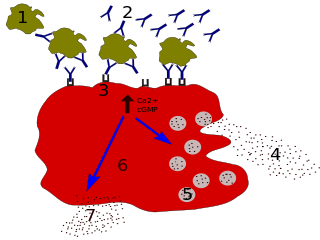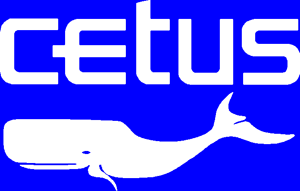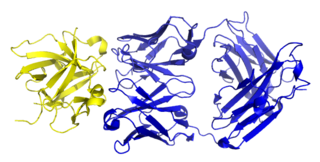
Novartis AG is a Swiss multinational pharmaceutical corporation based in Basel, Switzerland. Consistently ranked in the global top five, Novartis is one of the largest pharmaceutical companies in the world and was the fourth largest by revenue in 2022.

Immunosuppressive drugs, also known as immunosuppressive agents, immunosuppressants and antirejection medications, are drugs that inhibit or prevent the activity of the immune system.

Immunoglobulin E (IgE) is a type of antibody that has been found only in mammals. IgE is synthesised by plasma cells. Monomers of IgE consist of two heavy chains and two light chains, with the ε chain containing four Ig-like constant domains (Cε1–Cε4). IgE is thought to be an important part of the immune response against infection by certain parasitic worms, including Schistosoma mansoni, Trichinella spiralis, and Fasciola hepatica. IgE is also utilized during immune defense against certain protozoan parasites such as Plasmodium falciparum. IgE may have evolved as a defense to protect against venoms.
Omalizumab, sold under the brand name Xolair, is a medication to treat asthma, nasal polyps, and urticaria (hives).

Granulocyte-macrophage colony-stimulating factor (GM-CSF), also known as colony-stimulating factor 2 (CSF2), is a monomeric glycoprotein secreted by macrophages, T cells, mast cells, natural killer cells, endothelial cells and fibroblasts that functions as a cytokine. The pharmaceutical analogs of naturally occurring GM-CSF are called sargramostim and molgramostim.
Interferon beta-1b is a cytokine in the interferon family used to treat the relapsing-remitting and secondary-progressive forms of multiple sclerosis (MS). It is approved for use after the first MS event. Closely related is interferon beta 1a, also indicated for MS, with a very similar drug profile.

Cetus Corporation was one of the first biotechnology companies. It was established in Berkeley, California, in 1971, but conducted most of its operations in nearby Emeryville. Before merging with Chiron Corporation in 1991, it developed several significant pharmaceutical drugs as well as a revolutionary DNA amplification technique.

Integrin alpha M (ITGAM) is one protein subunit that forms heterodimeric integrin alpha-M beta-2 (αMβ2) molecule, also known as macrophage-1 antigen (Mac-1) or complement receptor 3 (CR3). ITGAM is also known as CR3A, and cluster of differentiation molecule 11B (CD11B). The second chain of αMβ2 is the common integrin β2 subunit known as CD18, and integrin αMβ2 thus belongs to the β2 subfamily integrins.

Biological therapy, the use of medications called biopharmaceuticals or biologics that are tailored to specifically target an immune or genetic mediator of disease, plays a major role in the treatment of inflammatory bowel disease. Even for diseases of unknown cause, molecules that are involved in the disease process have been identified, and can be targeted for biological therapy. Many of these molecules, which are mainly cytokines, are directly involved in the immune system. Biological therapy has found a niche in the management of cancer, autoimmune diseases, and diseases of unknown cause that result in symptoms due to immune related mechanisms.

Interleukin 17 family is a family of pro-inflammatory cystine knot cytokines. They are produced by a group of T helper cell known as T helper 17 cell in response to their stimulation with IL-23. Originally, Th17 was identified in 1993 by Rouvier et al. who isolated IL17A transcript from a rodent T-cell hybridoma. The protein encoded by IL17A is a founding member of IL-17 family. IL17A protein exhibits a high homology with a viral IL-17-like protein encoded in the genome of T-lymphotropic rhadinovirus Herpesvirus saimiri. In rodents, IL-17A is often referred to as CTLA8.
Cedelizumab is a monoclonal antibody acting on the immune system. Possible indications include the prevention of organ transplant rejections and the treatment of autoimmune diseases.

Canakinumab, sold under the brand name Ilaris, is a medication for the treatment of systemic juvenile idiopathic arthritis, active Still's disease, including adult-onset Still's disease, gout flares. It is a human monoclonal antibody targeted at interleukin-1 beta. It has no cross-reactivity with other members of the interleukin-1 family, including interleukin-1 alpha.
Lucatumumab is a human monoclonal antibody against CD40 development of which was discontinued by Novartis in 2013 after it was investigated for the treatment of various types of cancer like multiple myeloma and follicular lymphoma.
Nuvelo Inc. was a biopharmaceutical company engaged in the discovery, development and commercialization of drugs for acute cardiovascular disease, cancer and other debilitating medical conditions. On January 27, 2009, the company was acquired by ARCA Biopharma, Inc. in a reverse takeover transaction.

Cambridge Antibody Technology was a biotechnology company headquartered in Cambridge, England, United Kingdom. Its core focus was on antibody therapeutics, primarily using Phage Display and Ribosome Display technology.

Secukinumab, sold under the brand name Cosentyx among others, is a human IgG1κ monoclonal antibody used for the treatment of psoriasis, ankylosing spondylitis, and psoriatic arthritis. It binds to the protein interleukin (IL)-17A and is marketed by Novartis.

Incyte is an American multinational pharmaceutical company with headquarters in Wilmington, Delaware, and Morges, Switzerland. The company was created in 2002 through the merger of Incyte Pharmaceuticals, founded in Palo Alto, California in 1991 and Incyte Genomics, Inc. of Delaware. The company currently operates manufacturing and R&D locations in North America, Europe, and Asia.

Indacaterol/glycopyrronium bromide, sold under the brand name Ultibro Breezhaler among others, is a fixed-dose combination medication for inhalation consisting of the following two active ingredients:
Dinutuximab and dinutuximab beta are monoclonal antibodies used as a second-line treatment for children with high-risk neuroblastoma. Each antibody is made of both mouse and human components and targets glycolipid GD2, expressed on neuroblastoma cells and on normal cells of neuroectodermal origin, including the central nervous system and peripheral nerves. They differ in that dinutuximab is manufactured using mouse cells, and dinutuximab beta is manufactured using hamster cells. The dosing regime differs, and dinutuximab is given in combination with granulocyte-macrophage colony stimulating factor (GM-CSF), interleukin-2 (IL-2) and 13-cis-retinoic acid (RA), while dinutuximab beta can be given alone.

Lifitegrast, sold under the brand name Xiidra, is a medication for the treatment of signs and symptoms of dry eye, a syndrome called keratoconjunctivitis sicca. Lifitegrast reduces inflammation by inhibiting inflammatory cell binding. It is often used in conjunction with ciclosporin for dry eye treatment including meibomian gland dysfunction and inflammatory dry eye.













